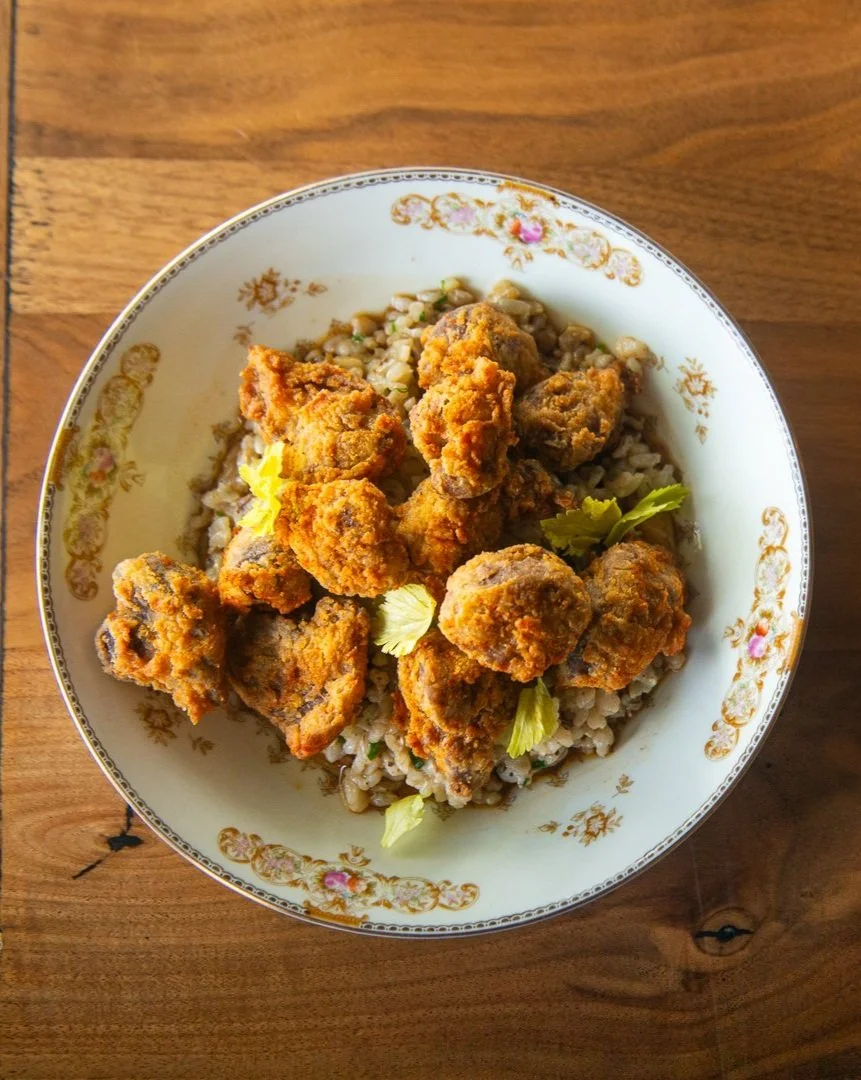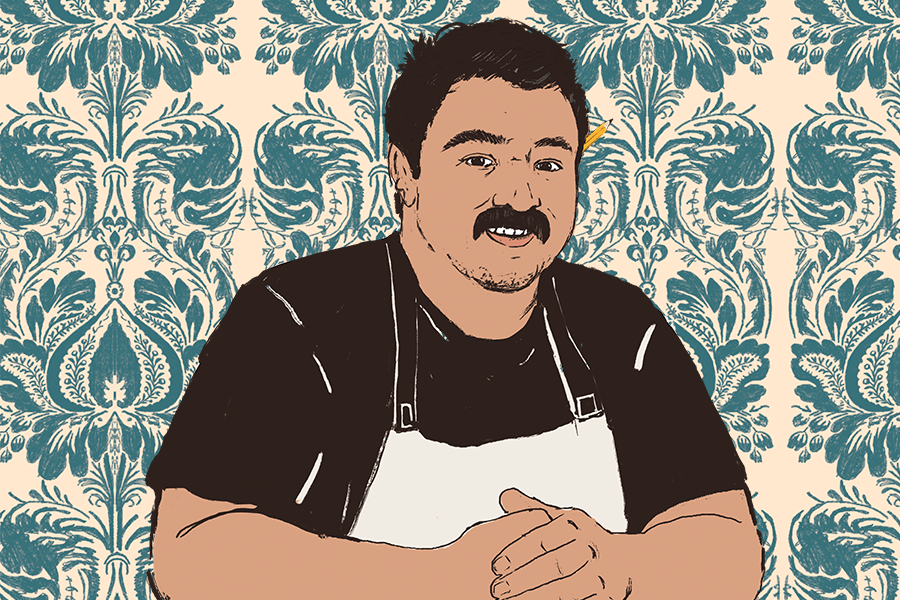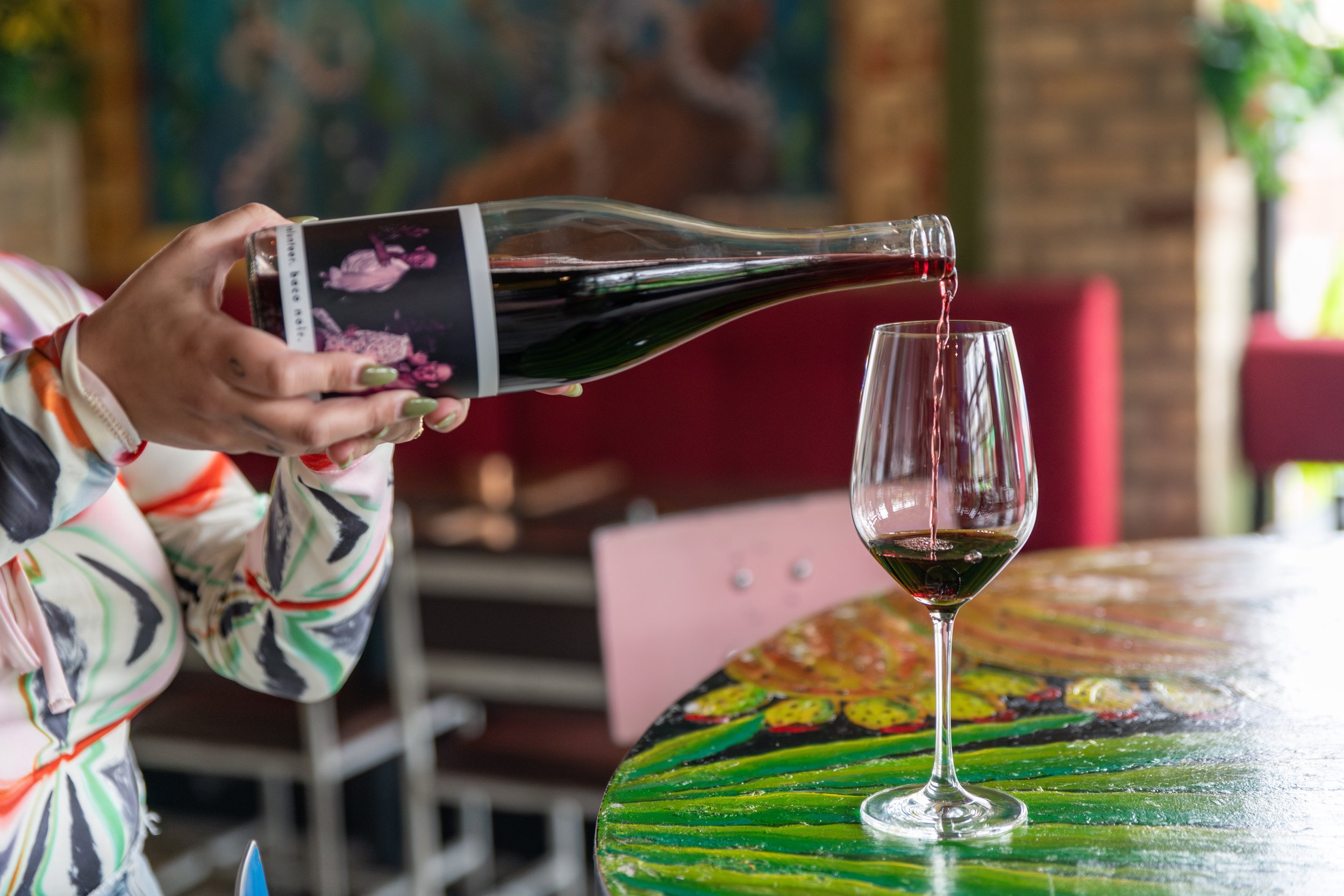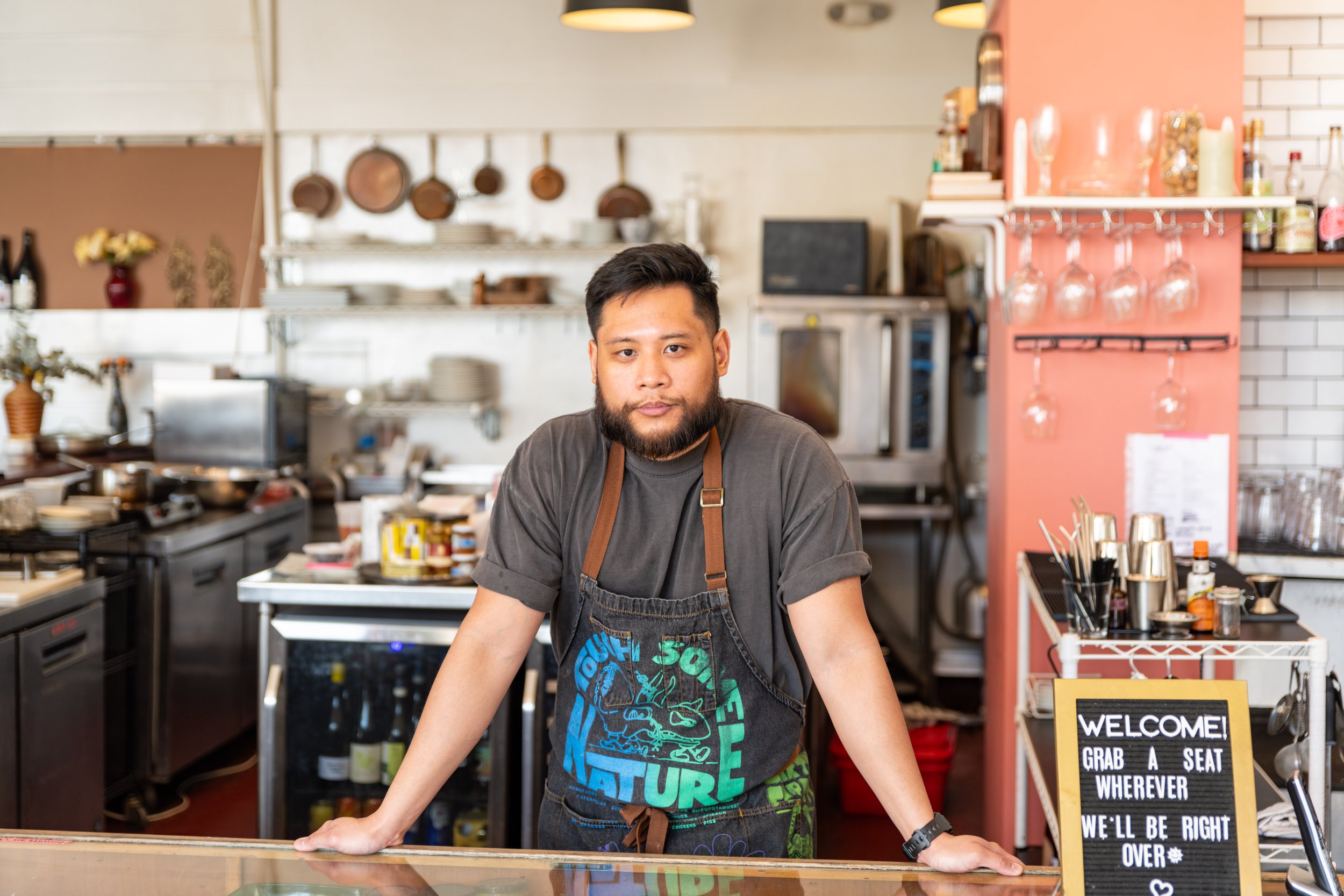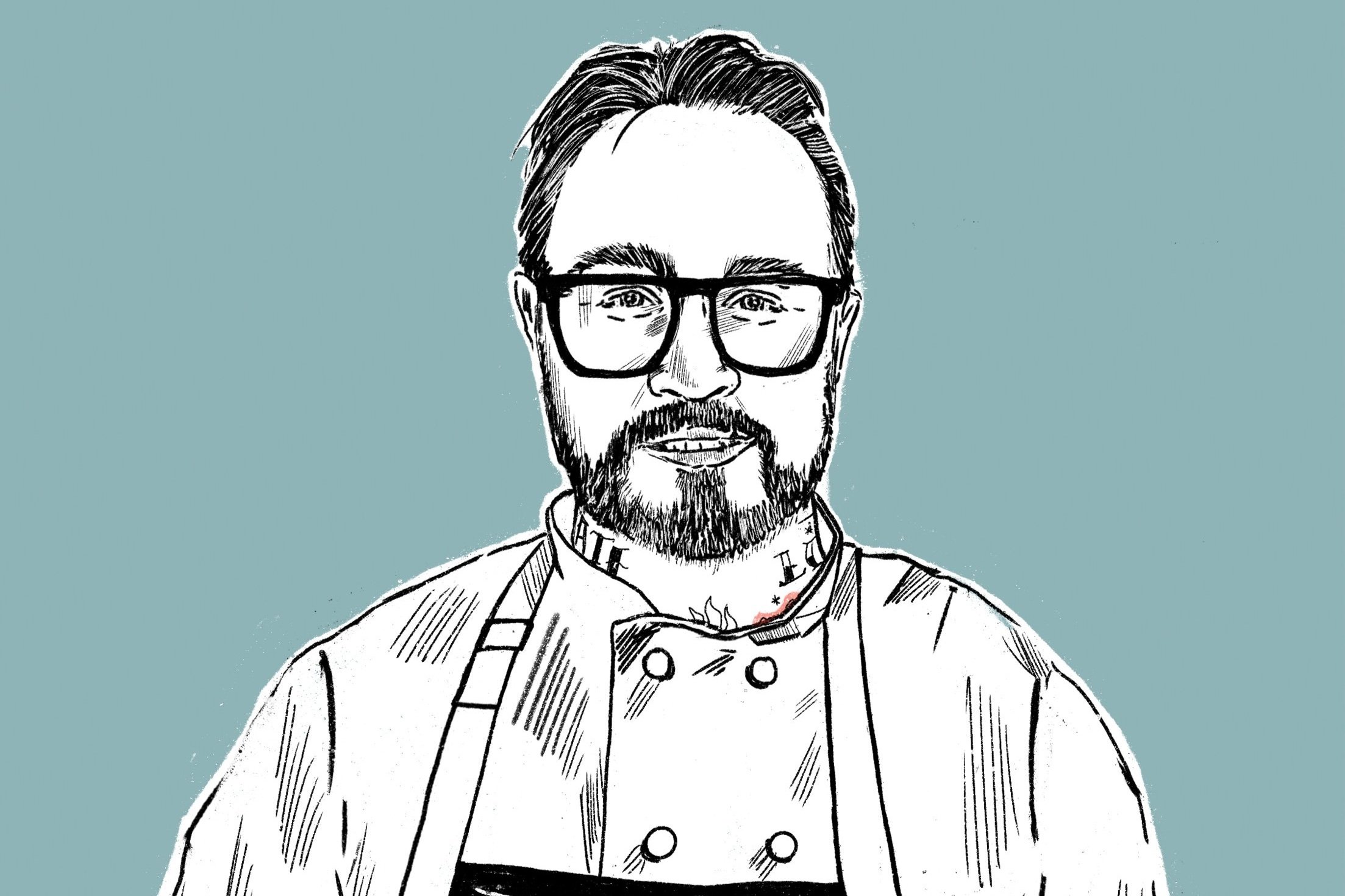A Piece of the Pie
Chef Erick Williams of Virtue Restaurant reclaims the term "farm-to-table" in a discussion of African American foodways.
Chef Erick Williams is a man of few words when it comes to his menu at Virtue Restaurant.
For instance, no explanation is necessary for the fried chicken gizzards, blackened catfish, and even his grandmother’s beloved cornbread, recipes that have quickly become savory staples at this contemporary, Southern-focused Chicago restaurant.
But it’s the “sweet rations” menu that’s certain to elicit a chuckle, followed by questions at the sight of We Finally Got a Piece of the Pie, a nod to the catchy theme song for the 1970s hit sitcom The Jeffersons. The show follows a Black family with a dry-cleaners business that’s so successful that it affords them material luxuries such as fur coats, a live-in housekeeper, and a “deluxe apartment in the sky,” their penthouse condominium on Manhattan’s Upper East Side.
The show emerged during a period when “many Black folk didn’t have a lot of access to wealth and access to opportunity,” says Williams, who serves as executive chef and owner at Virtue. The Jeffersons was aspirational. It showed viewers that if they worked hard, they too could get a “piece of the pie” and possibly a seat at the decision-making tables of America.
Chicken Gizzards, Dirty Rice, Chicken Liver Butter, Gravy at Virtue restaurant
Williams, however, interprets We Finally Got a Piece of the Pie as his opportunity to build the table of his dreams with Virtue so he can share the wealth with like-minded, creative people. And naturally, he has plenty to talk about on this topic. That includes African American foodways, his staff, surrounding communities, and, of course, the culinary community at large.
The veteran chef, born and raised on Chicago’s tough West Side, has been featured in major publications, earned Michelin recognition, and was a 2020 finalist for the James Beard‘s Best Chef: Great Lakes award. But what’s more important for him is passing on what he’s learned—formally and from his folks—to the next generation.
For Williams, historical context is everything. Therefore, understanding how The Great Migration from the South to Chicago plays a significant role in modern Southern fare is necessary. He believes Black people pioneered the farm-to-table movement in the U.S., yet they get very little credit.
Chef Erick Williams, Pastry Chef Becky Pendola, Chef Damarr Brown, and Sommelier Jesus Garcia. |. Photos: Will Blunt
“There are a lot of chefs who like to believe they were the first ones to town with farm-to-table, farm-to-fork, soil-to-table, and so on,” Williams says. “I would dispute many of the modern-day chefs who say they are the first to introduce it in their respective communities because my ancestors were the first to introduce Southern cooking as we know it in a seasonal approach. They didn’t have refrigeration. There was no freezer to pull something out of. What they did do was can, and canning is omitted from the farm-to-table conversations.”
Canning, smoking, curing, and fermenting were essential, explains Williams, because the techniques allowed them to enjoy out-of-season produce throughout the year. More important is that it helped save money on grocery bills. And when fruits and vegetables are canned at the peak of their seasons, he adds, they taste as though they were just picked. He believes the proof is in tasting his food.
We Finally Got a Piece of the Pie: Peanut Butter Mousse, Dark Chocolate Mousse, Graham Cracker Crust, Whipped Cream, Salty Peanuts, Cacao Nibs
“Chefs are flavor chasers, and we always want to work with optimum ingredients,” says Williams. “Artisans, craftsmen, people who are passionate about a thing want to work with the best of that thing that they possibly can.”
That brings us back to the pie. Like so many dishes at Virtue, it is seasonal. Since opening in fall 2018, the restaurant has featured talented Pastry Chef Becky Pendola’s interpretations of Southern classics like pecan pie, coconut cream pie, lemon meringue pie, sweet potato pie, and Key lime pie. While these desserts can be found on menus at most of the city’s soul food eateries, there’s a lot more here than meets the eye. It might look like just a pie, says Williams, but Pendola’s pastries focus on “uber-fine finishes and technique.”
And that’s the key to Williams’ success. He and his team have taken what are considered simple Southern ingredients and transformed them into masterpieces. That includes the crispy fried chicken gizzards, which are served over dirty rice and drizzled with a rich chicken reduction that we call gravy; the blackened catfish, which comes with a heaping of “Carolina Gold” rice and barbecued spiced carrots; and even his grandmother’s treasured cornbread, which arrives piping hot with house-made butter topped with local honey.
Williams’ sharp attention to detail is admirable, and he credits that to his grandmother’s tutelage—and his thirst for knowledge. He’s traveled throughout the South and studied the legacy of African American foodways, all while absorbing somber details about how his ancestors were omitted from America’s culinary history for centuries.
“We were the keepers of technique and the keepers of ingredient bases and the keepers of procedures in kitchens for many, many years in this country,” he says. “But we were not allowed to read and write, so this was all done through memory. … People like to omit the fact that the settlers didn’t cook their own food, and if they owned slaves, then slaves cooked their food. Their servants were the ones who cooked their food and grew their food and preserved their food and handled and managed their lands.”
As a result, he continues, recipes were stolen, and credit was not given to the originators. Until now. Authors and historians such as Adrian Miller, Dr. Jessica B. Harris, Toni Tipton-Martin, and Michael W. Twitty have been diligent in uncovering lost stories of these unsung culinary pioneers with their award-winning books Black Smoke: African Americans and the United States of Barbecue, High on the Hog: A Culinary Journey from Africa to America, Jubilee (Recipes from Two Centuries of African American Cooking), and The Cooking Gene: A Journey Through African American Culinary History in the Old South, respectively.
Williams additionally credits Edgar “Dooky” Jr. and Leah Chase for preserving African American foodways and culture with their landmark New Orleans restaurant. Dooky Chase’s Restaurant opened in 1941, and though both of its founders have passed away, their legacy will forever impact Williams and how he operates Virtue.
“It was this idea that there could be a safe space for Black folks during the most hostile times and a communal space for everyone when things were well,” he says. “[Virtue] has become that space in a way. The first seven days we were open, we had President Barack Obama in the building convening with friends. … During the pandemic, we had local and statewide officials reaching out to get a finger on the pulse of how we felt personally and how the restaurant community may have been feeling at the time.
“Our intention is to give space to everyday folk and to allow everyone outside of our race to see Black people in their element and to dine and commune with Black people in their element—and around our food with dignity and respect.”
In other words, there’s a piece of pecan, lemon meringue, or sweet potato pie waiting for anyone who enters the doors at Virtue.

